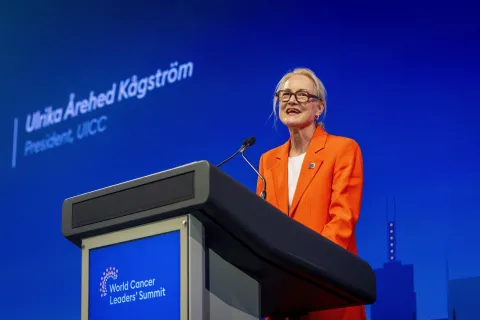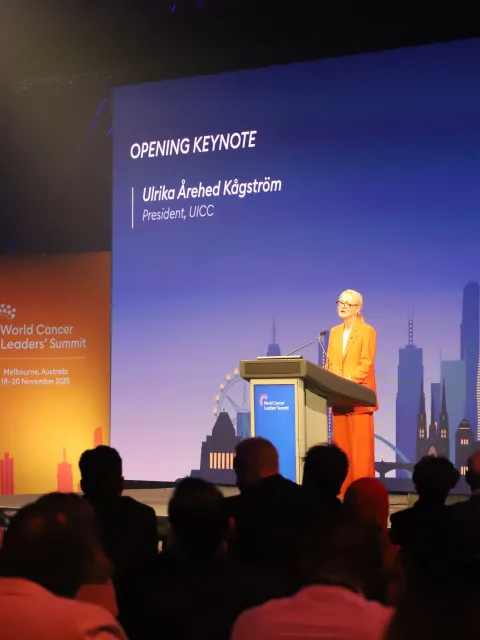UICC launches new World Cancer Declaration at Melbourne summit, outlining a roadmap for global progress in cancer control
The World Cancer Declaration 2025-2035 introduces a “5×5×5 by 2035” framework: five global targets, five national action domains, and five core principles to guide countries in advancing equitable, evidence-based cancer control.

Ulrika Årehed Kågström, President of UICC, present the World Cancer Declaration 2025-2035 at the World Cancer Leaders' Summit in Melbourne, Australia.
Developed through extensive consultation with UICC’s global membership, the World Cancer Declaration 2025-2035 sets out a practical, adaptable framework to guide national action and international collaboration over the next decade.
It was presented during a dedicated session by UICC President Ulrika Årehed Kågström, at the World Cancer Leaders' Summit taking place in Melbourne.
The Declaration introduces a structured approach – “5×5×5 by 2035” – that identifies five global targets, five national action domains, and five core principles. Together, these elements aim to guide countries and stakeholders in strengthening their cancer control efforts in a way that is equitable, accountable, and responsive to local context.
Five global targets by 2035
- 25% reduction in global cancer mortality, through strengthened prevention, early detection, and equitable access to treatment and palliative care.
- 30% reduction in exposure to major cancer risk factors, including tobacco, alcohol, air pollution, and infectious agents such as HPV and Hepatitis B.
- 60% of cancers diagnosed at an early stage, focusing on cancers with established screening and early detection strategies.
- 80% of cancer care facilities equipped with essential medicines, diagnostics and technologies, ensuring safe, effective and affordable treatment.
- 50% of countries integrate essential cancer services into Universal Health Coverage (UHC) packages, to reduce financial hardship and improve access.
Five domains for national action
- Planning and implementation of comprehensive, evidence-based national cancer control plans with clear timelines and financing.
- Cancer information systems to produce reliable data on incidence, mortality, stage at diagnosis, treatment outcomes, and risk factors.
- Research and innovation to accelerate locally appropriate solutions and strengthen implementation research capacity.
- Education and training to expand and support a skilled cancer workforce through ongoing professional development.
- People-centred care, including meaningful engagement with patients and communities in programme design and delivery.
Five core principles to guide delivery
- Equity: ensuring all populations can access cancer services without discrimination or disparity.
- Collaboration: fostering transparent, cross-sectoral partnerships aligned with public health goals.
- Evidence: grounding policy and action in robust research and data.
- Sustainability: developing scalable, long-term strategies across the cancer care continuum.
- Accountability: securing political commitment and mechanisms for monitoring progress.
“With the ‘5×5×5 by 2035’ framework laid out in UICC’s World Cancer Declaration 2025–2035, countries have a practical roadmap to guide progress that is anchored in equity, evidence, and collaboration,” said UICC President Ulrika Årehed Kågström. “It’s about closing the gap between what we know works, what is available, and what is being delivered, particularly for communities that have long faced barriers to timely, quality cancer care.”
–Ulrika Årehed Kågström, President of UICC and Secretary-General of the Swedish Cancer Society
The Declaration builds on previous iterations launched under UICC’s leadership in 2006, 2008, and 2013, and aligns with broader global health commitments such as the WHO Global Action Plan on NCDs and the UN Sustainable Development Goals. It also aims to support governments and stakeholders in integrating essential services into universal health benefit schemes.
Last update
Friday 05 December 2025
